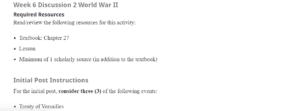World War II
Explain if the United States, despite neutrality, aided the Allies against the Axis powers.
The Treaty of Versailles was signed in 1919 (June) in Paris, just when World War I ended. The treaty codified the peace terms between Germany and the victorious Allies. The treaty also held Germany responsible for the commencement of the war and proceeded to impose very steep penalties for territory loss, demilitarization, and massive reparations payments (OpenStax, 2019). The League of Nations was created for the prevention of another world war. However, in two decades, the efforts proved to be unfruitful. World War II eventually came to be, following feelings of humiliation, more so by Germany, weakened successor states, renewed nationalism, and economic depression (OpenStax, 2019). Lastly, the Lend-Lease Act allowed the U.S. government to lend war supplies or lease the same to any nation that the country believed to be critical to U.S. defense. With this policy’s provisions, the U.S. could offer supplies and military assistance to its foreign allies during World War II. The U.S. could do this while remaining neutral in the conflict. The Act helped Great Britain continue fighting Germany as an isolated nation until the U.S. joined the war in 1941 (OpenStax, 2019). So, yes, the U.S. aided the Axis powers by being a party to the Treaty of Versailles, a League of Nations member, and lending/leasing military supplies to Great Britain.
Are you interested in an original copy of “World War II”? Reach us at eminencepapers.com
Could the United States have prevented the outbreak of World War II?
The U.S. could have prevented the outbreak of WWII if it had taken a less stubborn stance of isolationism. President Roosevelt took the German threat very seriously right from the onset. He should have taken a stronger stand against the Nazis; however, public sentiment did not side with this kind of stance up until the war broke out in 1939 (Von Klemperer, 1994). If the U.S. had taken a more rigid opposition against Hitler immediately after he got into power, Hitler would most likely not have annexed Austria or remilitarized the Rhineland. Additionally, had the U.S. supported France and Britain at Munich in 1938, these would have blocked the move by Germany to annex Czechoslovakia? It would also have marked the end of Germany under Nazi rule (Von Klemperer, 1994).
Further, Britain was most likely to back up the coup with the German military against the Nazis, which didn’t occur because the coup organizers were not guaranteed British support. Lastly, Germany’s military viewed Hitler’s aggressiveness with concern, and even the generals knew the odds were against them (Von Klemperer, 1994). However, if the U.S. had taken an early stand, the German military would have gotten the morale to fight the Nazis.
Other Related Post: MBA Reflection
References
OpenStax. (2019). U.S. history. OpenStax CNX. Retrieved from https://cnx.org/contents/p7ovuIkl@6.18:gMXC1GEM@7/Introduction
Von Klemperer, K. (1994). German resistance against Hitler: the search for allies abroad, 1938-1945. Oxford University Press.
ORDER A PLAGIARISM-FREE PAPER HERE
We’ll write everything from scratch
Question 
Week 6 Discussion 2 World War II
Required Resources

World War II
Read/review the following resources for this activity:
- Textbook: Chapter 27
- Lesson
- Minimum of 1 scholarly source (in addition to the textbook)
Initial Post Instructions
For the initial post, consider three (3) of the following events:
- Treaty of Versailles
- Rise of fascism, militarism and imperialism
- Failure of the League of Nations
- Hitler and the Nazi Party
- The Lend-Lease Act
- Japanese expansion and the bombing of Pearl Harbor
Based on your three selections, choose two (2) of the following and craft a response for your selections:
- Assess if the United States’ foreign policy during the 1930s helped to promote World War II. Could the United States have prevented the outbreak of World War II? If so, how? If not, why not?
- Explain if the United States, despite neutrality, aided the Allies against the Axis powers.
- Analyze if using atomic (nuclear) weapons to defeat enemies in war is a setback for democracy (President Truman’s decision to drop the atomic bomb on Japan).
Follow-Up Posts
Compare your selections and analysis of selections with those of your peers. If they chose different events, examine how yours are similar and different. If they chose the same events, build on their posts by providing additional information about the events that you have not already noted in your post.
Writing Requirements
- Minimum of 3 posts (1 initial & 2 follow-ups)
- APA format for in-text citations and list of references
Grading
This activity will be graded using the Discussion Grading Rubric. Please review the following link:
- Link (webpage): Discussion Guidelines
Course Outcomes (CO): 3, 5, 6
Due Date for Initial Post: By 11:59 p.m. MT on Wednesday
Due Date for Follow-Up Posts: By 11:59 p.m. MT on Sunday
Search entries or author Filter replies by unread Unread Collapse replies Expand replies